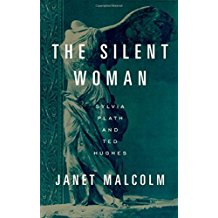The Silent Woman: Sylvia Plath and Ted Hughes, Janet Malcolm, 1994
How to start describing this remarkable book? Malcolm, perhaps the pre-eminent long form journalist of our time, takes on the Sylvia Plath/Ted Hughes controversy providing the bare details of Plath’s life (born in 1932 in Jamaica Plain, attended Smith, married Hughes in 1956 after a four month relationship, had two children, published two volumes of poems (Collosus and Ariel) and the novel, the Bell Jar, committed suicide in 1963 in Yeats’ former residence on Fitzroy in London) as almost an afterthought to her deep investigations of the many books about Plath and Hughes as well as Malcolm’s over-arching, and ever-present exploration of journalism and biography. This book follows the pattern of other works by her—the visiting of homes and important sites as she did in her book about Chekhov, the interviews with major characters as she did in her book about Jeffrey MacDonald. She delves deeply into the fraught relationship of the journalist and the biographer with their subjects with wonderful language and phrases, e.g. ‘letters are the great fixative of experience…fossils of feeling.’ From many superb passages, here’s one that will give a taste of what this book is about: ‘In most interviews, both subject and interviewer give more than is necessary. They are always being seduced and distracted by the encounter’s outward resemblance to an ordinary friendly meeting. The meal that is often thrown around it like a cloth, to soften the edges; the habits of chat and banter; the conversational reflexes, whereby questions are obediently answered and silences too quickly filled—all these inexorably pull the interlocutors away from their respective desires and goals.” Later in the book she describes the house of Trevor Thomas, the downstairs neighbor of Platt and the last person to see her alive, as follows: “Later as I thought about Thomas’s house, it appeared to me as a kind of monstrous allegory of truth. This is the way things are, the place says. This is unmediated actuality, in all its multiplicity, randomness, inconsistency, redundancy, authenticity. Before the magisterial mess of Trevor Thomas’s house, the orderly houses that most of us live in seem meager and lifeless—as in the same way, the narratives called biographies pale and shrink in the face of the disorderly actuality that is a life.” I could quote on and on, but this gives a flavor of this superbly talented writer who explores the challenges of writing about the incredible mystery of lived lives. She draws contrasts between the journalist and the subject, the biographer and the ‘truth’, the living and the dead, Sylvia and Ted. All life, to Malcolm, is subjective and the result of conflicts between individuals, ideas, and memories of the past. As Keynes said, “In the long run, we’re all dead.”



